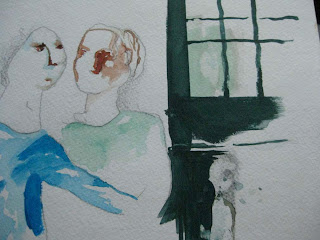
This small, extremely self-polarizing statement is dedicated to one of the few world class music writers I know, Francis Davis, in congratulations on his recent Grammy for the liner notes to Columbia's Miles Davis-Kind of Blue 50th Anniverasy Edition. Francis is a writer with an unparalleled gift, and a genuinely good person, which among the vocation knows even fewer parallels still.
I've lost the will to criticize music at age 33.
The reason is, I think, because on some fundamental level by doing so I find myself trying to anticipate the experience of hearing. The older I get the less I care about the lives of musicians, the reasons they do what they do. I don't fuss as much over their mistakes and I don't appreciate the perfection.
Over the weekend I came across a fantastic little essay written by H. L. Mencken for a publication called Smart Set, in 1919, called "The Music Lover". Mencken especially advised the humanists who seek to teach a love of music to the unformed student heart, as if conveniently in the rote-learned appreciation of Scarlatti might also flower a resistance to commit violent crimes or masturbate immoderately.
Some people will move to music, others simply won't. They don't need to learn the notes of the scale, the traditionalist convictions of Brahms or difference between modal and tonal jazz. No amount of classroom pummeling is going to affect the inner lantern.
The mark of a music lover then is the urge to create his own music, Mencken went on to say. But seeing as he wrote the essay well before the advent of ubiquitous music journalism he might suffer a small modification: There are many of us whose sole function is to bray indulgently, often without conviction on any number of subjects. On music, our numbers are legion and most highly braying. It could be that we music writers are the ones most sorely in need of the creative act we observe: the clumsy, arhythmic and often just plain self-conscious who hide our personal music in our bedrooms or in our heads.
Whatever we think of active musicians, those of us who love music find in it something transcendent. As such the act of creating it isn't so much an artifice, such as seeing a tree in nature and drawing its likeness, as it is a possessed and probably uncontrollable communication of something grander. It is a natural passage through the body of the musician. As critics we envy that with a searing redness. And when we feel the musician has erred in the conveyance we pounce.
So, without impulse, age 33, I have grown mostly comfortable with the notion of listening and listening only--a pronouncement that even now I defy arrogantly. To be in love with something requires that you do not distract it by anything but the disturbance of love. Some critics would argue that's exactly what they do. But often the written word reads different. There is bitterness and personal neediness with no place in the writing. The urge to find beauty is supplanted by a thirst to name-stamp new discoveries. The masculine urge to recharacterize the sound in one's own voice and likeness obliterates the kernel of reverence--I speak from some experience.
I have come to a place where, at 6:15 on Saturday evening, on every Saturday evening--as I am forming habits with age, I pull a record from its sleeve, play it, wishing I had no idea who the people responsible for the sounds were, wishing even the names and pictures were gone.
There is one tendon of resistance to the joyous abyss of hearing it on those anonymous terms:
I go over to the computer, invariably and with the urgeless propriety of myself, age 17, and change my Facebook status to read:
Bryan is listening to
It's an irresistible force, not unlike a song.











